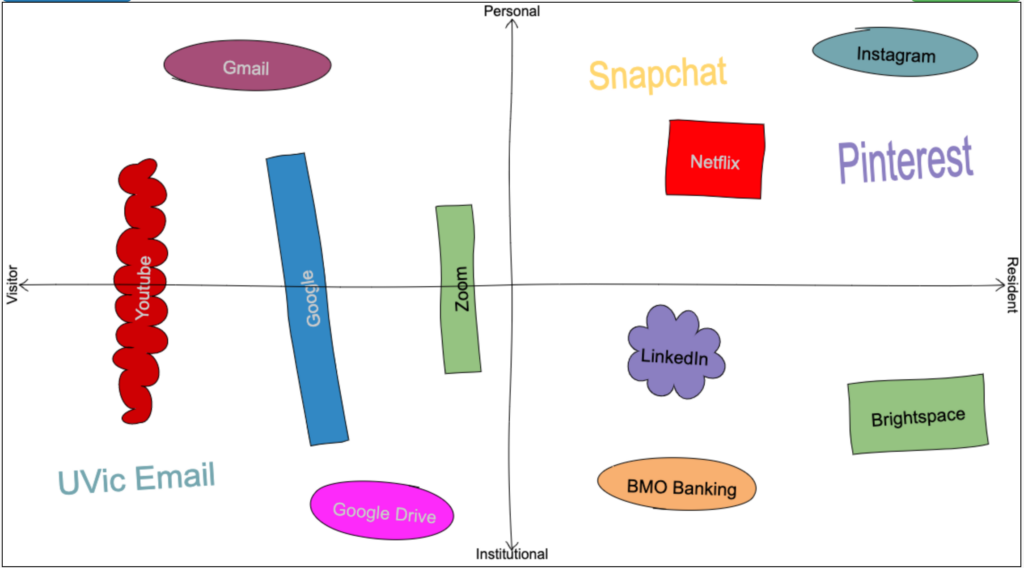Below is my V&R Mapping. I use social media primarily for personal uses, such as Snapchat and Instagram. I use YouTube, Google, and Zoom for both personal and institutional reasons. I use LinkedIn to build my professional learning networks, and Gmail and Google Drive for school-oriented tasks.

What digital platforms are students currently using to develop their professional network?
I primarily use zoom, email, and LinkedIn to further develop my professional network. I use Gmail as my formal form of communication. For instance, when I need to reach out to club facilitators, a boss, or a landlord, I prefer to use email rather than text. Email contains the necessary space to send lengthy, work-related emails and contains a subject bar so the viewer can understand the subject of the email prior to opening it. When contacting friends or family, however, I prefer to use iMessage or alternatively WhatsApp for people residing outside of Canada. In addition, LinkedIn is extremely popular software for forming professional relationships. Here, you can connect with people from various professional fields and present your work experience for potential job opportunities.
Zoom has been a particularly important aspect of my professional learning since the start of COVID-19. Rather than using casual platforms for face-to-face communication such as Skype or Facetime, Zoom allows students to interact with other classmates and professors on a professional level. This interaction consists of lectures, labs, meetings and also allows people to create their own zoom invitations for other work-related requirements. For instance, I have participated in quite a few job and club interviews via zoom over the past several months which allows a more personal connection to form rather than a phone call.
What could a student consider in expanding their professional learning network?
Before relying on online software to expanding professional learning networks, people should focus on forming in-person professional connections, such as with TAs, professors, classmates, and like-minded family friends. In person connections are much more meaningful than online connections and tend to create more professional opportunities in the future. With the COVID-19 pandemic persisting the last couple years, forming these real-life connections have been difficult. Hopefully with in-person classes resuming this semester, more in person professional connections can be established and professional learning networks can be expanded.
In the future if I wish to create a professional brand or business, I will utilize social media to expand my professional learning network. Social media allows you to attract and connect with many potential customers or potential business associates. In particular, I would open a professional Instagram page (separate from my personal Instagram page), and further my business plans from there.
In your network how can you create a digital identity/reputation?
When creating and maintaining a digital identity and reputation, it is important to maintain your personal integrity. For instance, you must be honest when sharing professional skills or experiences in order to maintain a good and honest reputation. If false information is discovered belonging one’s digital identity, it can be extremely damaging to one’s reputation and can follow them into the future. For instance, if someone posts a controversial or offensive opinion online or lies on their resume, even if it gets deleted later on, this becomes a part of their digital footprint and will remain accessible to others in the future. This can be particularly damaging when employers conduct background checks on potential employees, and therefore, it is important to be careful when posting content online.
Find out what a local employer would find based on your V+R Map if you applied for a job with them?
Local employers would readily find my LinkedIn account and be able to gauge my professional skills and abilities. From here, they can contact previous employers I have had and understand my work ethic and experience level. They would be able access my social media accounts, such as Facebook and Instagram, and judge what I have posted or shared there. They would also be able to access my email and understand my ability to focus on professional communication. From these platforms, they will better understand the type of person I am and if they believe me to be well suited to the job at hand.